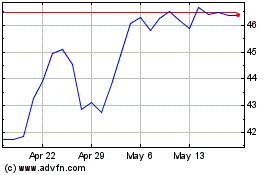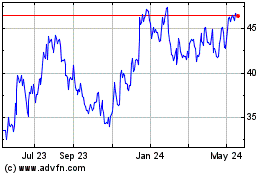Following Years of Challenges, Small Business
Owners Project A Bright Outlook Even Amid Economic Hurdles
Small business owners and decision makers are optimistic about
the economic outlook for the year ahead, with 60% expecting a
slight or significant increase in revenue, according to a new
survey conducted by WSFS Bank, the primary subsidiary of WSFS
Financial Corporation (Nasdaq: WSFS). The survey polled 597 small
business decision makers to gauge their feelings on the state of
their business and financing needs in the current economy. For
purposes of this data, small business owners are identified as
those at businesses with annual revenues of up to $5 million and a
minimum of two employees.
While respondents’ views of the past two years mainly reflect
economic challenges encountered, many plan to seek financing to
invest in key business needs in 2025, signaling an optimistic
shift. Additionally, these owners are confident in their ability to
secure that financing. The most common planned investments include
purchasing equipment (26%), obtaining working capital (25%), and
funding expansions (24%).
“Small businesses have demonstrated remarkable adaptability in
an environment where uncertainty has become the norm,” said Candice
Caruso, Senior Vice President, Chief Business Banking Officer, WSFS
Bank. “Many small business owners are planning ahead and
transforming their businesses by embracing technology, refining
operational efficiencies, and seeking new ways to serve their
customers. We are proud of the role that WSFS plays in helping to
propel these investments and keeping small businesses at the heart
of the communities they serve.”
Challenges Facing Small Businesses Despite a more
optimistic outlook for the future, the past two years have
presented many hurdles for small business owners. For those who
believe the past two years have had a negative impact on their
business, the rising inflation rate (59%) is seen as the primary
factor, followed by the cost of living crisis (45%) and the looming
threat of a recession (31%). More than a quarter also pointed to
reduced consumer spending (27%), while over a fifth mentioned
supply chain disruptions (23%) and economic uncertainty surrounding
the recent election (22%).
In response to these challenges, more than half (54%) of
respondents have cut back on non-essential spending, with many
opting for more affordable suppliers (27%). Additionally,
one-quarter of respondents have chosen to delay non-essential
investments.
“As small businesses navigate an evolving economic landscape,
it’s more important than ever to closely examine areas like debt
management, strengthening vendor relationships, and exploring
strategic financing options to fuel growth,” said Jeremy
Shackleford, Senior Vice President, Director of Small Business
Sales for WSFS Bank. “Additionally, businesses should continue to
monitor and build their credit profiles, as well as work with
trusted partners, like their banker and accountant, to identify
opportunities for cost savings. By taking these steps, small
businesses can not only weather current challenges but better
position themselves for the future.”
Banking Expectations and Preferences When selecting a
banking partner, the majority (53%) report banking with a large
national bank, while nearly three in ten (29%) report using a
smaller regional bank. Small community banks are the least common,
with 16% using these as their banking partner.
When it comes to expectations from their banking partner, small
business owners most frequently seek assistance with obtaining
business credit cards, with over half (53%) relying on their
banking partner for this. Cash flow management (38%) and capital
for growth (36%) are also common expectations. Additionally,
one-third (33%) of small business owners expect payment solutions
and merchant services from their banking partner.
About half of respondents report their banker is proactive in
helping with loans and lending solutions as well as providing tools
and resources (both 51%). However, less than half feel their bank
is proactive in helping them navigate economic uncertainty (46%)
and with business planning (47%).
“The last several years have taught us to expect the unexpected.
As a regional bank, we work to form strong partnerships with our
small business Clients to best serve their needs with intimate
knowledge of the communities where they operate and the local
decision-making capabilities to help them reach their goals,”
Caruso explained. “It’s key at the onset of your banking
relationship to establish expectations and reevaluate those
regularly. When it comes to preparing for economic headwinds and
long-term planning, proactive support from a banking partner is a
must.”
When it comes to meeting with their banker in person versus face
to face, small business leaders are fairly split between what they
prefer within specific circumstances. For example, small business
owners are equally split between preferring in-person meetings
(35%), preferring virtual meetings (32%), and being impartial (34%)
for obtaining business credit cards. However, when it comes to more
nuanced services – such as customized business planning and
lending, the majority prefer to be in person (66% and 62%,
respectively).
Deep Dive: Read the full report on survey results.
Survey Methodology The survey was conducted by market
research and insights agency Opinium. The sample includes a survey
of 597 small business owners/decision makers, with 351 respondents
from the Mid-Atlantic and 246 from the broader U.S. All respondents
were over the age of 18. The online survey was conducted from
November 18 – December 2, 2024. It has a margin of error of +/- 4
percent.
About Opinium, Inc. Opinium is an award-winning strategic
insight agency built on the belief that in a world of uncertainty
and complexity, success depends on the ability to stay on pulse of
what people think, feel and do. Creative and inquisitive, we are
passionate about empowering our clients to make the decisions that
matter. We work with organizations to define and overcome strategic
challenges – helping them to get to grips with the world in which
their brands operate. We use the right approach and methodology to
deliver robust insights, strategic counsel and targeted
recommendations that generate change and positive outcomes.
About WSFS Financial Corporation WSFS Financial
Corporation is a multibillion-dollar financial services company.
Its primary subsidiary, WSFS Bank, is the oldest and largest
locally headquartered bank and trust company in the Greater
Philadelphia and Delaware region. As of September 30, 2024, WSFS
Financial Corporation had $20.9 billion in assets on its balance
sheet and $87.2 billion in assets under management and
administration. WSFS operates from 114 offices, 88 of which are
banking offices, located in Pennsylvania (57), Delaware (39), New
Jersey (14), Florida (2), Nevada (1) and Virginia (1) and provides
comprehensive financial services including commercial banking,
consumer banking, treasury management and trust and wealth
management. Other subsidiaries or divisions include Arrow Land
Transfer, Bryn Mawr Capital Management, LLC, Bryn Mawr Trust®, The
Bryn Mawr Trust Company of Delaware, Cash Connect®, NewLane
Finance®, Powdermill® Financial Solutions, WSFS Institutional
Services®, WSFS Mortgage®, and WSFS Wealth® Investments. Serving
the Greater Delaware Valley since 1832, WSFS Bank is one of the ten
oldest banks in the United States continuously operating under the
same name. For more information, please visit www.wsfsbank.com.
View source
version on businesswire.com: https://www.businesswire.com/news/home/20250121251376/en/
Media Contact: Andrew Davison (215) 309-1064
adavison@wsfsbank.com
WSFS Financial (NASDAQ:WSFS)
Historical Stock Chart
From Jan 2025 to Feb 2025

WSFS Financial (NASDAQ:WSFS)
Historical Stock Chart
From Feb 2024 to Feb 2025
